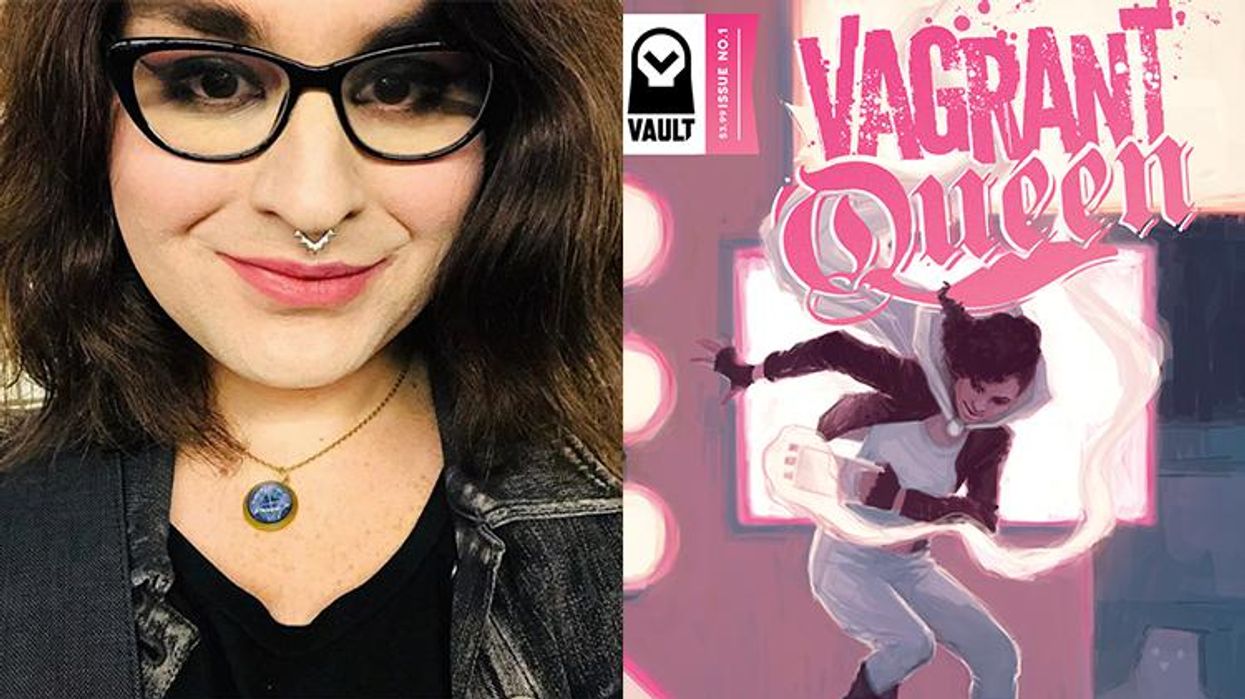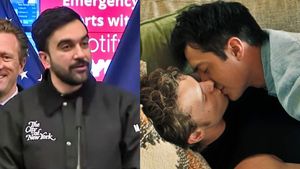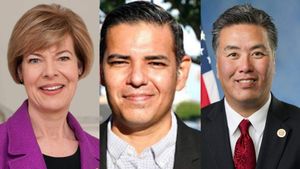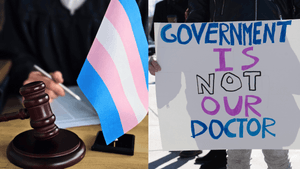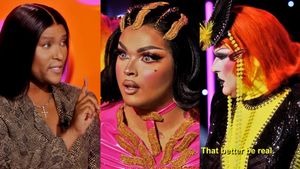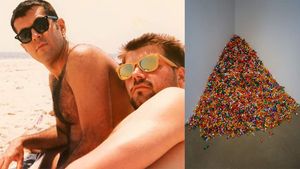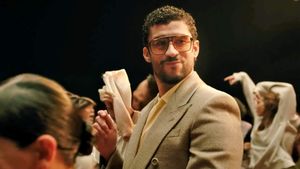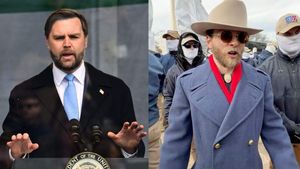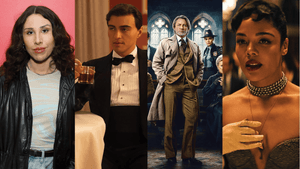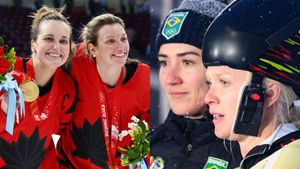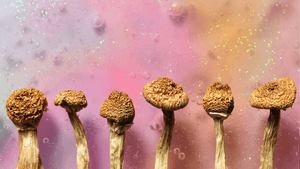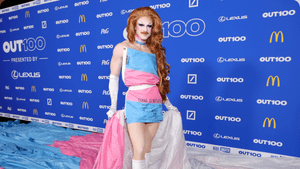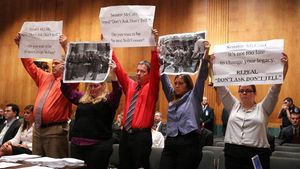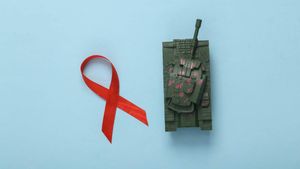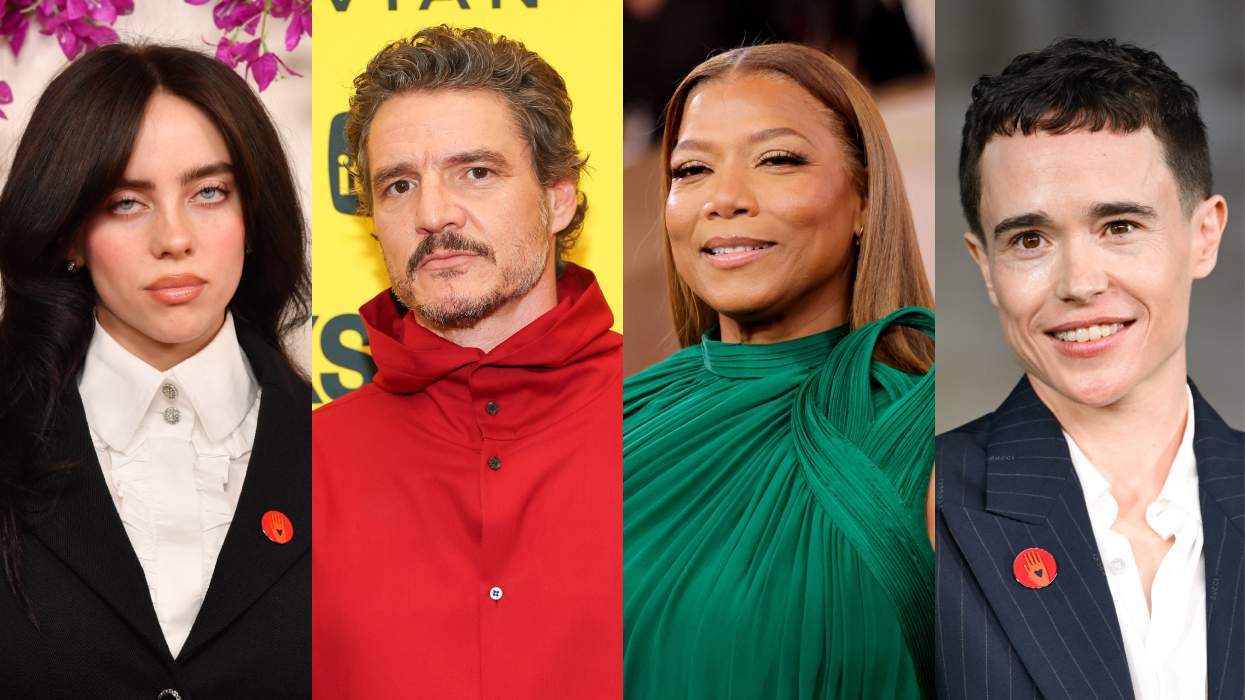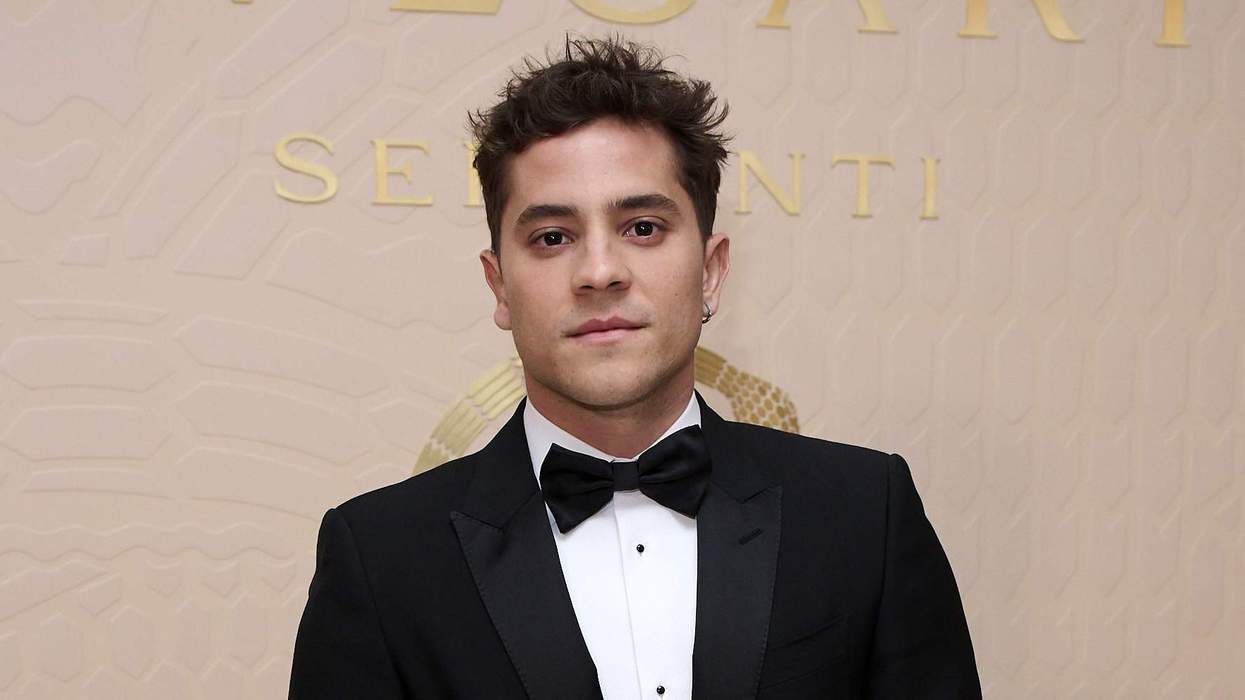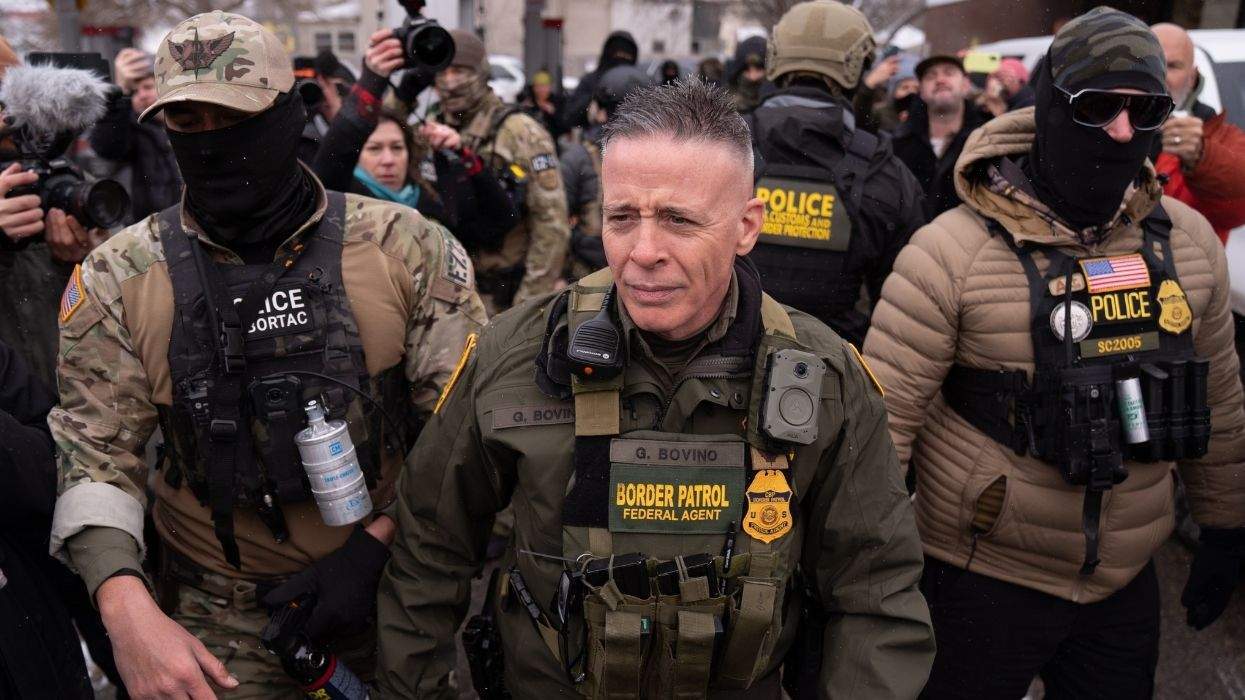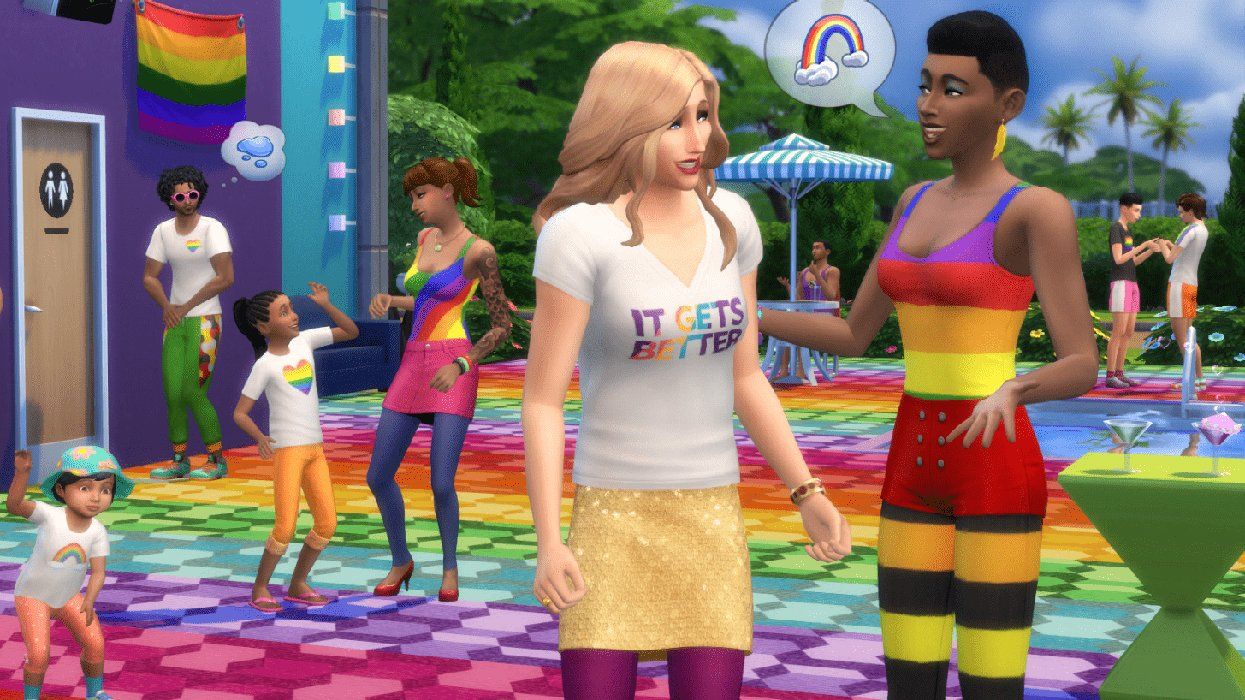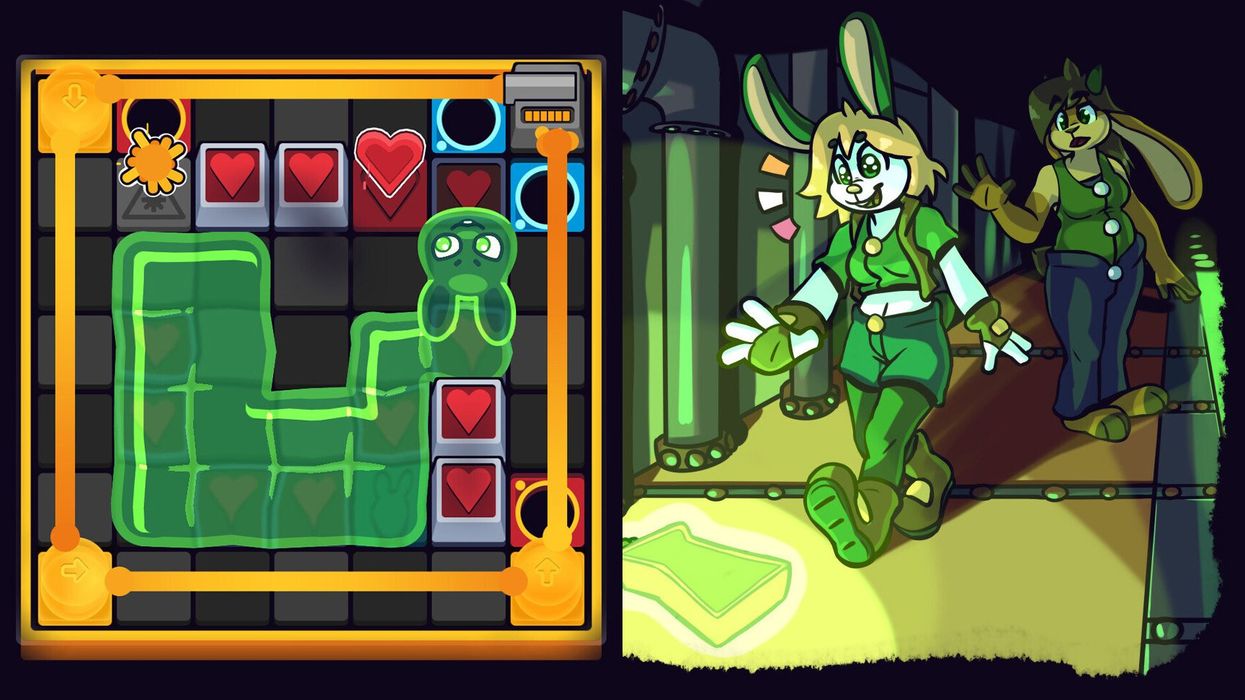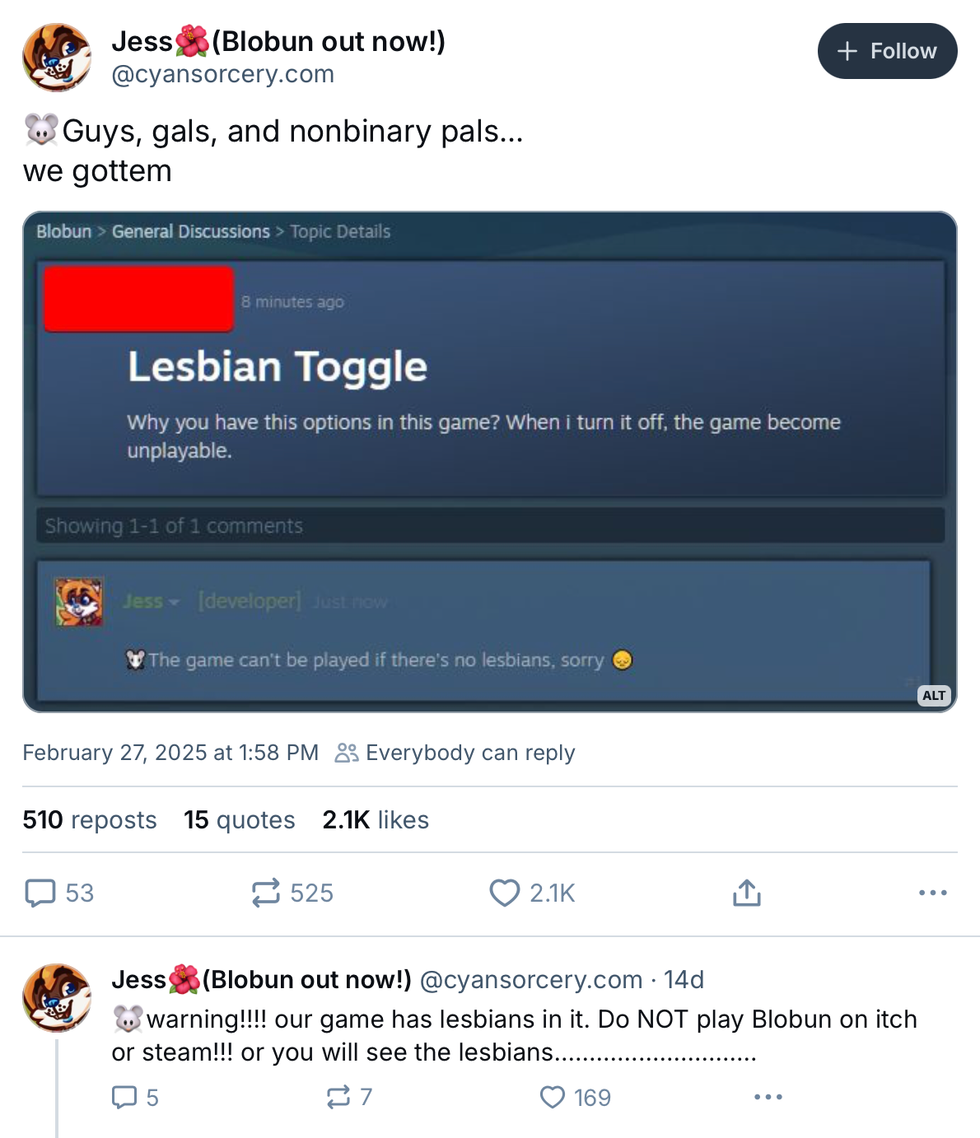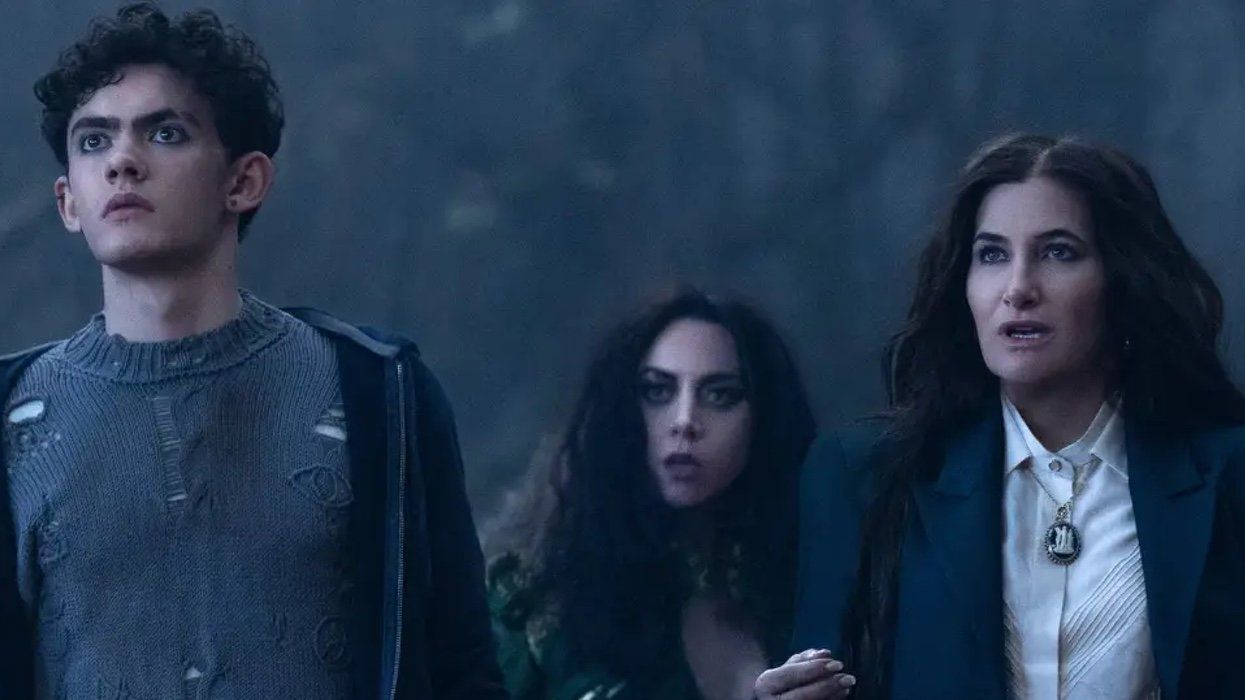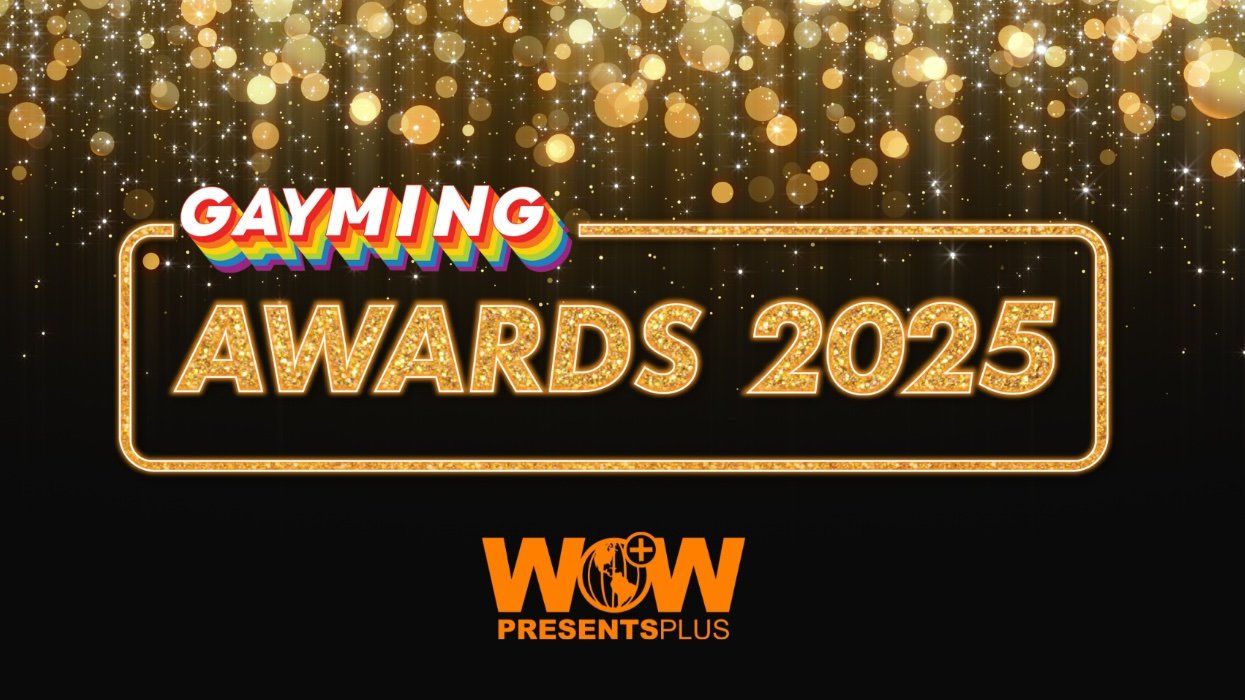Eisner- and GLADD Media Award-nominated comic writer of Eternity Girl and Kim & Kim, Magdalene Visaggio has quickly built a name for herself in just a few short years. By creatively mixing issues of mental health, queerness, and identity within the superhero and space opera genres, Visaggio has pushed the boundaries of what is possible for mainstream comic books to convey. PRIDE recently sat down with Visaggio at Emerald City Comic Con in Seattle to discuss her latest graphic novel Vagrant Queen, the guarded optimism of today’s science fiction, and how LGBTQ creators navigate the toxic elements of geek culture.
PRIDE: Where did the idea for Vagrant Queen come from?
Magdalene Visaggio: Vagrant Queen came out of an earlier project, a self-pub me and Jason [Smith] did in 2015 called Andrew Jackson in Space, which had a different version of [main character] Elida, [who] was a supporting character. And actually the original plot outline for Andrew Jackson in Space was basically what we ended up doing in Vagrant Queen. And we ended up not doing it with Andrew Jackson in Space because it was very much focused on Elida. So she's always been the character who I found the most compelling. To me she's got such an interesting situation. I couldn't tell you where the idea came from, except that I'm a history nerd and I imagine I must have been reading something about the French Revolution.
Speaking of Eldia, I loved how you dive into how her family weren’t perfect rulers, and how she learns and grows from that.
Yeah. The book's about rejecting legacies. That's what [villain] Lazaro and Elida are both doing. And so if you're going to do something about rejecting legacies, the reader has to understand what that legacy means, what that means to them, what their experience of being in that legacy is. Again, that's why we gave Lazaro an entire issue. Like, we weren't going to. I had to get extra money for that. But I was like, for this book to really land, Lazaro's...I know Lazaro's situation. Lazaro's situation needed narrative focus to shine the light on how the two interrelate. And there's this moment in that issue where it has Elida's escaping the palace and Lazaro's storming the roof. The two lock eyes, and they're now set incontrovertibly on a path together. That's the moment that changes both of their lives forever. So it's just kind of a matter of going to tell that kind of story that, how all of those different pieces fit together, has to be dealt with.
Another element that I found super interesting is your two male leads, the villain Lazaro and the character Issac who has this Han Solo-esque, scoundrel vibe. What was the impetus for creating them contrasting them with each other?
[When] Isaac...the Han Solo character, originated he was Andrew Jackson, right? And, we needed someone to fill his role. We ended up scrapping the book when Trump got elected because I'm like, "This is the wrong time." But I like writing books about garbage people. I love writing shitty, messed up people who...No one's being cruel for the sake of it, but they can't stop themselves from hurting people and each other. And so, I look at someone like a Han Solo character, a Mal Reynolds, and they're just kind of lovable rogues, but I didn't want to do a lovable rogue. That's been done. I wanted to do a piece-of-shit rogue. The guy genuinely sucks, and if you're sympathetic to him it's because there's a level at which you're starting to get him. But it's not because he's not really that bad. He's not a hero in disguise. Everyone's very self-interested. The Andrew Jackson character is always playing off the Han Solo archetype because the two have so much in common. Even Han Solo specifically and Andrew Jackson. Everything from their attitude overall to fairly specific details of their biographies. The two line up quite well. And, so, with Isaac we're trying to build up this guy who is shitty and oily, but the cockiness was not endearing, you know? That he genuinely thought he was better than you.
What draws you to those types of characters?
If I had to guess, my 20s were unrelenting failure and missed potential. I nearly flunked out of college, I dropped out of grad school, I left seminary in utter defeat, my faith collapsed, I got fired a bunch of times. It was a really bad time. I don't know if that's why, but I guess I'm just interested in examining the relationship that people have to failing. Because that's really compelling to me. I grew up reading superhero comics and Star Trek: The Next Generation where ultimately everyone wins. Ultimately you win. The good guy wins. And that really hasn't been my experience.
In Vagrant Queen, you set up this arc where you think Eldia will end up becoming queen again, or at least a ruler. And that's not where this goes. So what made you decide to end how you did?
Of course that's the obvious place for it to go. And I had no interest in that. That was actually originally where it went in the original outline way back when it was Andrew Jackson in Space. [But] things need to have consequences. I like writing about failure, and Star Wars, which is the primary thing this book is riffing on, is all about destiny, reclaiming things and restoration. And I don't believe in that. Elida lost the crown when she was 10. I hope I make clear early that it was a role for which she was deeply unsuited. She had doubts about it from her childhood. She gets the crown at 8, and is mainly like "Why are, why are we being awful to everyone?" And everyone's like "No, just ignore it." Why would she ever want to go back to that? And, for her life since then, she's had the bewildering deference of loyalists who worship her as a god. And she's just like this person, because she didn't grow up in the palace. She's been out and seen the universe, she's experienced hardship.
I don't like doing the expected thing, as much as I can. I like it when everyone dies at the end. I like it when people turn their back on their heritage. I like it when people walk away from their families. I like it when Excalibur gets broken at the end because King Arthur doesn't want to be King. Like the whole Skywalker legacy, and everyone just falls into their place in destiny. That’s why I liked The Last Jedi. My favorite incarnations of any media are the ones that break its rules. And I always think of Deep Space Nine for Star Trek.
Jumping off of that, this is not your first space opera story. What draws you to that genre in particular?
I grew up watching Star Trek. That's what I think about. The basic rules of Star Trek, the assumptions it makes about space and how we interact with it is so fundamental to all of this, still underlie how I think about science fiction. So that's just sort of naturally the direction I want to go. I'm trying to branch out into looking at what are other ways to do space opera, but the basic of just pondering the stars is very close to me.
What do you think sci-fi like Star Trek says about today? Or what can we learn from it?
I don't know, and I don't like saying that because I think Star Trek assumes a lot of things about people and about the United States in particular that are not true. And I don't think that's something we've confronted until very recently. If you go back and you watch, especially The Next Generation, it's got such a rosy view of, really, the progress of humanity. And that these things will just be obvious, and that was all part and parcel of a narrative we had about how the twentieth century had gone. And I see Star Trek, in a lot of ways, as a relic of optimism that we don't have anymore, which is why Discovery is so much less so. The optimism is guarded now.
Star Trek is boundless, leaping, joyous optimism. And, you know, everyone just wants to sign up and fly around in space and explore things and advance the cause. And there's this sense of a mission that we were all able to kind of get behind. And there's a sense of unity that is utterly artificial.
A lot of your work like Eternity Girl or Vagrant Queen is taking these genres and tropes but grounding them. How do we update these stories while still trying to hold on to what they were?
I think by doing exactly that. [Be] fully aware of the problems. I'm a very big fan of The Orville because it takes the formula of classic TNG-era Trek and just has just a thin layer of cynicism over it. And, but it's not ironic distance, it's totally invested in its world. It's not making fun of it. Even the characters who start off kind of as jokes become really well developed. But there's a cynicism, 'cause everyone's just kind of shitty. Everyone just kind of sucks. Ed Mercer sucks, you know? Gordon sucks. They all hurt each other and mock each other and riff, rib on each other. And it feels like a realistic, like, group of co-workers. And that's a lens through which Star Trek has never really been looked at. At the end of the day, everyone's being united by the sense of mission that is, there's an ideology driving Star Trek that simply isn't really present in The Orville, because The Orville isn't generated by belief, but by love. The Orville is not the result of Seth McFarlane's ideologic convictions about the universe the way Star Trek is ultimately Gene Roddenberry's. It's built on a love for Star Trek. And so its core is the variation on a theme, not the theme.
And so what I find really fascinating about that is, as the show's been finding its voice, it's focusing less, and less, and less on the Star Trek plots and more, and more, and more on the ship drama and the characters' relationships. They did an episode this season called "A Happy Refrain," which was extraordinary television. It was phenomenal, where Claire and Isaac begin their relationship. I was literally, like, getting teary. It was moving. They took a cliché Star Trek plot and they owned the premise in a way that Star Trek is never allowed to do.
I think the same way we're constantly refreshing, rehashing, and reevaluating, reappropriating Shakespeare, Chaucer, you know, all the works of literature that we continually revisit and reevaluate and do new takes on. I don't think it's even a new model we need to find. Just treat them as objects of culture that we are allowed to be in conversation with and to eventually make new productions. And we're actually already kind of doing that. Star Trek has that kind of staying power because it does speak to this part of the human spirit, and our sense of optimism. When I say it's a dream to wake up from, it's still a dream that we keep.
To go somewhere different, how do you think you being transgender informs your work?
Apart from the fact that I sort of make a point of writing trans characters, I'm not sure. There are themes I keep coming back to. I write a lot about identity. Eternity Girl is, at the end of the day, a fairly trans book of fiction. But just, it doesn't wear that on its sleeve. It probably just comes down to the things that I'm drawn to as a writer. Kim & Kim is such a queer book, not in the fact that it has queer characters, but in the fact that they live in a clearly queer context. They live in a recognizably queer context of financial worry and instability, and broken families, of surrogate families. I've often been in those situations. Both Kims have these troublesome, distant relationships with their parents that come out of an ultimate disapproval of the way they're living. And that's mutual. And don't we all sort of have that with our family? How emblematic is that of being queer.
Why do you think queer people find such a community within nerdom?
I have a theory, which is that we're not notable. We're not a deviation. I have a feeling that you've got those communities everywhere, and we're seeing it because we're queer and in fandom. I think you're gonna see that in any kind of subculture, there's gonna be subcultures within subcultures. I think queer people, in fandom, we're more visible because we're just, as a community, kind of flashy, you know? Like, our whole philosophy is just let your freak flag fly.
As someone from the trans community you've come across a lot of harassment in the comic industry. And, in as much as you feel comfortable, how does seeing that out in the world affect you?
Without getting into a lot of specifics about what I personally went through, I'm really numb and callused at this point. Like, they can't say anything to me they haven't said 80 trillion times. They'd be hard pressed to be worse to me than they've already been. There's a degree to which I've had to put a lot of emotional distance between it and just kind of get numb about it, which sucks.
When I see someone's being targeted, I try to reach out to suggest resources and to offer any support that I can because I had people who did that for me, and I want to make sure that people have access to the resources that really do help keep you safe. But beyond that, just seeing it all out in the world, it's kind of hard not to sort of turn off emotionally. I think the best thing we can do is maintain a sense of community and solidarity. Just stick together. Have each others' back when we need it. Provide resources and emotional support when we need it. And the problem with that is that places a lot of the burden on victims who make their needs known, which will often only invite more problems. So I don't really have a solution. I really don't.
You’ve talked numerous times about mental health and dealing with depression. But what's inspiring to me, personally, as someone who tries to be creative and is also trans as well, is seeing you just being so out there and creative, and just doing all this fun work. How does it feel for you to kind of be in this place where you're now creating?
It kind of doesn't feel real or grounded. I had this realization a couple years ago. I go to a con and here people know who I am. There's a degree of fame. I'm not Scott Snyder or Bendis or anything. But there's a degree of that experience, like here this is a context in which the things that I've gotten to do matter, you know? And then I leave and it's just, I have to write for a couple hours a day, and the rest of my life is basically the same. So, there's a degree to which it's kind of detached from my reality. We'll see if that changes. There's a lot of really interesting stuff going on that I can't talk about that feels just unbelievably unreal…
I'm so grateful that I've had the opportunities to tell stories, as many stories as I have in the unique way that comics offers. That's a rare gift. I've gotten to write Superman. That's not something every aspiring comic writer gets to do. So I just try to be grateful for it and keep things in perspective, which I haven't always been that capable of doing. However talented I am, there's people who are better writers than me who haven't gotten ahead for whatever reason because they didn't have the right project at the right time. They didn't have the right advocate at the right time. It's all a crapshoot. It's all random. It's so weird how random it is because I have people coming up to my table and gushing about, you're a fan. And I just, I don't know how emotionally to respond to anything like that. It's unreal. It is unreal.
Is there any other advice you'd give to anyone who's trying to be creative, trying to be an author?
It's never gonna be your work until you make it your work. It's never gonna be your job until you treat it like it already is. Every craft is just time and pressure. And if you don't put in the work, it's not gonna get there. It seems like such a basic thing, but a lot of people want to be writers more than they want to write. And that was me. So I'm not criticizing. But when people find that they can't make themselves work, a lot of times it's just because, let's be honest, you just would just rather be doing something else. And that's okay. It's not a judgment to not want to write. Because then you can just not do that. You don't have to make yourself feel bad for not wanting to write. Just be like, okay, well that's maybe not something I really enjoy. And maybe that's not the work for me. If it is, then you have to make it that. Right? Write for at least two hours a day, five days a week. That alone won't make your career, but if you're not doing that, you're gonna get nowhere. You have to be willing to put in the effort.
This interview has been edited and condensed.
Visaggio’s latest graphic novel, Vagrant Queen, is available for purchase here! Jessie Earl is a video producer for Microsoft Unboxed and the host of PRIDE's Nerd Out, as well as her own transgender and geek-focused YouTube channel.
